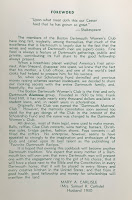 The epigraph from the Boston Dartmouth Women’s Club'sFavorite Dartmouth Recipes, published sometime in the 1960s, reads:
The epigraph from the Boston Dartmouth Women’s Club'sFavorite Dartmouth Recipes, published sometime in the 1960s, reads:Neatly bound in Dartmouth green with a rustic illustration of the lone pine on the cover, the cookbook appears to be a benign, domestic gesture of support on the part of Dartmouth wives and mothers to the college. Mary Carslile, wife of Samuel R. Carlisle class of 1930, is the author of the forward and begins with: "The members of the Boston Dartmouth Women's Club have long felt, modestly, among themselves, that much of the excellence that is Dartmouth is largely due to the fact that the wives and mothers of Dartmouth men are superb cooks." It seems that Carslile chose this quote to suggest women in domestic roles have a strong influence over creating powerful Dartmouth men. Carlisle even cites astronaut Alan Shepard as having a mother who was a club officer and therefore "helped to prepare him for his success.

Carlisle’s diction continues to reveal the tension these women felt between realizing their ambitions and divulging their true personalities and maintaining a veil of passive, proper domesticity:
"We expect that every mother of a Dartmouth boy will own one, that every Dartmouth man will present one with the engagement ring to the girl of his choice; that it will have a place next to the Bible and the Constitution in every Dartmouth home; that it will be placed in every library and every creative kitchen in the United States."
A cookbook is inherently a domestic object, and motherhood and marriage fall into the domestic, feminine sphere. However the Bible and the Constitution are arguably the two most important texts in American history. In comparing the cookbook to those texts, Carlisle elevates the book’s status beyond the domestic sphere and suggests something about the book and it’s creators set out important moral and social values. Perhaps the women thought that this domestic veil was the best way for them to subtly assert their own power in their husbands’ and sons’ lives.
But Carlisle may have encoded a more radical message in her forward. She notably attributes her epigraph to Shakespeare generally rather than reveal that the line is spoken by the shrewd traitor Cassius in the play Julius Caesar. Cassius conspires to kill Caesar to prevent him from becoming a tyrant. Perhaps this epigraph is Carslile’s subtle message that the women of the Boston Dartmouth Women’s Club are not complacent in their seemingly ancillary role that they must play to achieve influence over the College and, by extension, their husbands and sons.
Whether or not Mary Carslile was channeling Cassius in 1966, it is true that the women’s clubs affiliated with Dartmouth didn’t just produce cookbooks. In fact, there was a time when women used these fundraising clubs as a way to escape their domestic duties. Equally important as what went on in the clubs is why there was a need for them in the first place. Dartmouth women have long fought to be included on campus and still struggle to find spaces where they are entirely free to be ambitious. From long before co-education, women-only organizations like the Boston Dartmouth Women's Club served as important early venues for the more elite Dartmouth women to convene and indirectly influence the college.
To see the cookbook, ask for DC History TX715 .D37.
Posted for Cecelia King '23, recipient of a Historical Accountability Student Research Fellowship for the 2021 Winter term. The Historical Accountability Student Research Program provides funding for Dartmouth students to conduct research with primary sources on a topic related to issues of inclusivity and diversity in the college's past. For more information, visit the program's website.